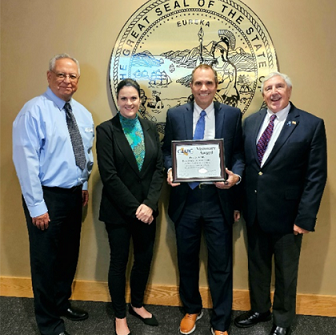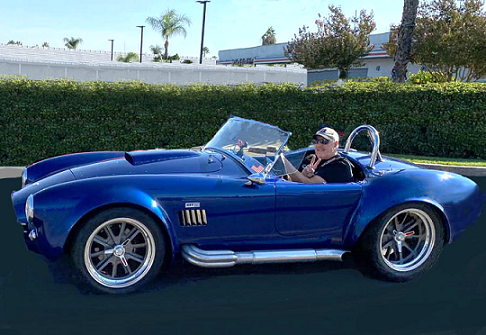Building Industry-Bureau Collaboration: An Interview with Johan Gallo
Johan Gallo has always had a passion for cars. It started as a young boy repairing and restoring old cars with his father. By high school he was a classic ‘gearhead’ with a penchant for the occasional drag race and, “10W-40 oil instead of blood running through his veins.” During high school, Gallo worked at an Arco gas station before taking a job his senior year as a maintenance technician with Firestone Tire & Rubber Company. Within six months he was promoted to sales and management. After high school, Gallo went to college at night to earn an AA degree, then a BA and finally an MBA, all while working full-time at Firestone. During his 42-year career with Firestone, he held the position of Consumer Affairs Analyst, Human Resources Manager of Western Region Retail Operations, and finally Manager of Human Resources and Government Affairs. He retired from Firestone in 2014.
Gallo was not content to simply pursue a career in the automotive industry. His role at Firestone managing government affairs granted him numerous opportunities to interface with the Office of the Attorney General and the Bureau of Automotive Repair (BAR). He saw opportunity to improve the industry for all stakeholders and consequently channeled his energy into helping establish the Automotive Repair Coalition (ARC) which was founded in 1992. He served in leadership roles at ARC, later renamed the California Automotive Business Coalition (CalABC), from 1992 until he retired as Executive Director in December 2023. He served on the BAR Advisory Group, which he was instrumental in helping to create, from December 1998 to December 2023.
Gallo continues to be involved with CalABC as a historian and consultant. He enjoys time with members of the Grand Terrace Cars & Coffee Group he founded and continues to restore old cars. He has restored over 12 cars to date and is helping one of the Cars & Coffee Group members convert a 1962 Corvair into an EV with Tesla running gear. We met with him to learn more about his work at CalABC and his time on the BAR Advisory Group.
Why was ARC/CalABC established?
ARC was founded in 1992 by Joe Jubela, who, like many others in the automotive repair industry, felt there was a lack of representation within the agency overseeing their profession. The automotive repair industry had taken a beating in the media over BAR’s case against Sears Automotive Centers. Not all of the Sears Automotive Centers were conducting business in the manner Sears was charged with, but the media began painting everyone in the industry in the same bad light. It got to the point where members of the media were doing their own undercover operations and sending sting cars into repair shops.
When I became president of ARC in 1995, the board was looking for ways to offset the negative perceptions of the industry. After numerous meetings, we concluded the only way to create a change was to bring the entire automotive industry together to address the problem. While many were skeptical about bringing major competitors together, I was convinced it was the only way to change how the industry was perceived and how it was regulated. In 1996 we held a summit with participants from small independent shops to major automotive retailers in attendance as well as trade associations and education institutions. In all, nearly 13,000 automotive repair shops were represented and the alliance forged at the summit was the catalyst for creating the BAR Advisory Group.
How did CalABC help to establish the BAR Advisory Group?
Prior to the summit, CalABC was working with the Lucas Communications PR firm. After the success of the summit, we knew we needed to hire a lobbyist to ensure the industry was duly represented in legislation and CalABC selected the Nossaman firm. We worked with Chris Walker and Richard Harrison who set out to find an author to draft a bill that would create an oversight committee for BAR. Senator Polanco authored SB 214 that would have established a BAR board of directors. However, it was determined that Governor Wilson was not amenable to creating more oversight bodies and would likely veto SB 214. Chris Walker worked with several members in the Senate Business and Professions Committee to propose an alternative option. Governor Wilson was asked to issue an Executive Order to form a BAR Advisory Committee on a trial basis. In 1998, Governor Wilson signed Executive Order 188-98 which established a two-year interim BAR Advisory Group. Because of the success of the BAR Advisory Group, BAR has continued with it to this day. And with the passage of AB 1263 (Berman, Chapter 681, Statutes of 2023), the BAR Advisory Group has been codified and will continue to advise BAR on regulatory issues and programs affecting the automotive repair industry.
How has the relationship between CalABC and BAR evolved?
I think it’s important to note that former BAR Chief Marty Keller and I arrived in leadership positions at our respective organizations at the same time. Chief Keller and I seemed to share a vision that government and business could accomplish more by working together. Chief Keller had a different vision for BAR, just as I had a different vision for CalABC.
After the 1996 summit, we began meeting regularly in an effort to solve many of the issues within the industry and the problems consumers were having. Over time, the relationship steadily improved, communication got better, and by working together more rules and regulations to protect consumers were enacted. By working shoulder to shoulder, all stakeholders— consumers, automotive repair educators, and the industry— benefitted. It was my pleasure to present Keller with the first CalABC Visionary Award in 1999. Keller saw the importance of CalABC’s work and became CalABC’s first Executive Director in 2002. In October 2023, we were pleased to present current BAR Chief Patrick Dorais with a Visionary Award for his ongoing commitment to collaboration.


Pictured left: Johan Gallo presents the first Visionary Award to former Chief, Marty Keller. Pictured right: Along with Bud Rice and Tess Dubois-Cary, Gallo presents the Visionary Award to BAR Chief Patrick Dorias.
With the rapid changes in the automotive industry, what do you see as some of the challenges and opportunities for the industry and for BAR?
Today’s vehicles are extremely complex. You’re basically driving a portable computer, with all of the technology that’s built into them. Working on them requires much more training. And while the industry continues to evolve and become more technical, parents, educators, and counselors still have the mindset that everyone should go to a university, get a degree, and become a business professional. As a result, the demand for qualified automotive repair technicians continues to grow while the supply of new technicians entering the workforce declines. We will all have to pull together to promote and support career opportunities in the industry.
Any words of advice for the industry and for BAR?
We can only hope that BAR continues the work that was begun by Chief Marty Keller and is carried on with Chief Patrick Dorais. As I stated before, we’ve accomplished far more working together and I hope that collaboration lives on regardless of leadership changes.
You will stay on with CalABC as a consultant and historian. Do you have any specific plans?
I know the CalABC Board of Directors and even BAR was concerned when I announced that I was retiring. I assured them that I didn’t give 32 years of my life to just walk away. I like to say, “Passion doesn’t punch a clock.” I am passionate about the people who work in our industry and the hundreds of thousands of cars they fix every year. I’m passionate about the work we do, and I care deeply about the perception and image of our industry. I look forward to staying involved as a consultant and historian.
I believe that CalABC’s collaboration with BAR over the past 25 years has done so much to ensure consumer protection. We focused on the issues in the marketplace and worked together to correct them. I can only hope going forward that our working relationship serves as a model for other agencies, boards, and bureaus to work together with the business community they regulate. Working together, we’ve gained a mutual respect for one another. It has been a fulfilling journey and I am grateful to everyone who has contributed to our successes.

Gallo in his 1965 Superformance Cobra replica.
